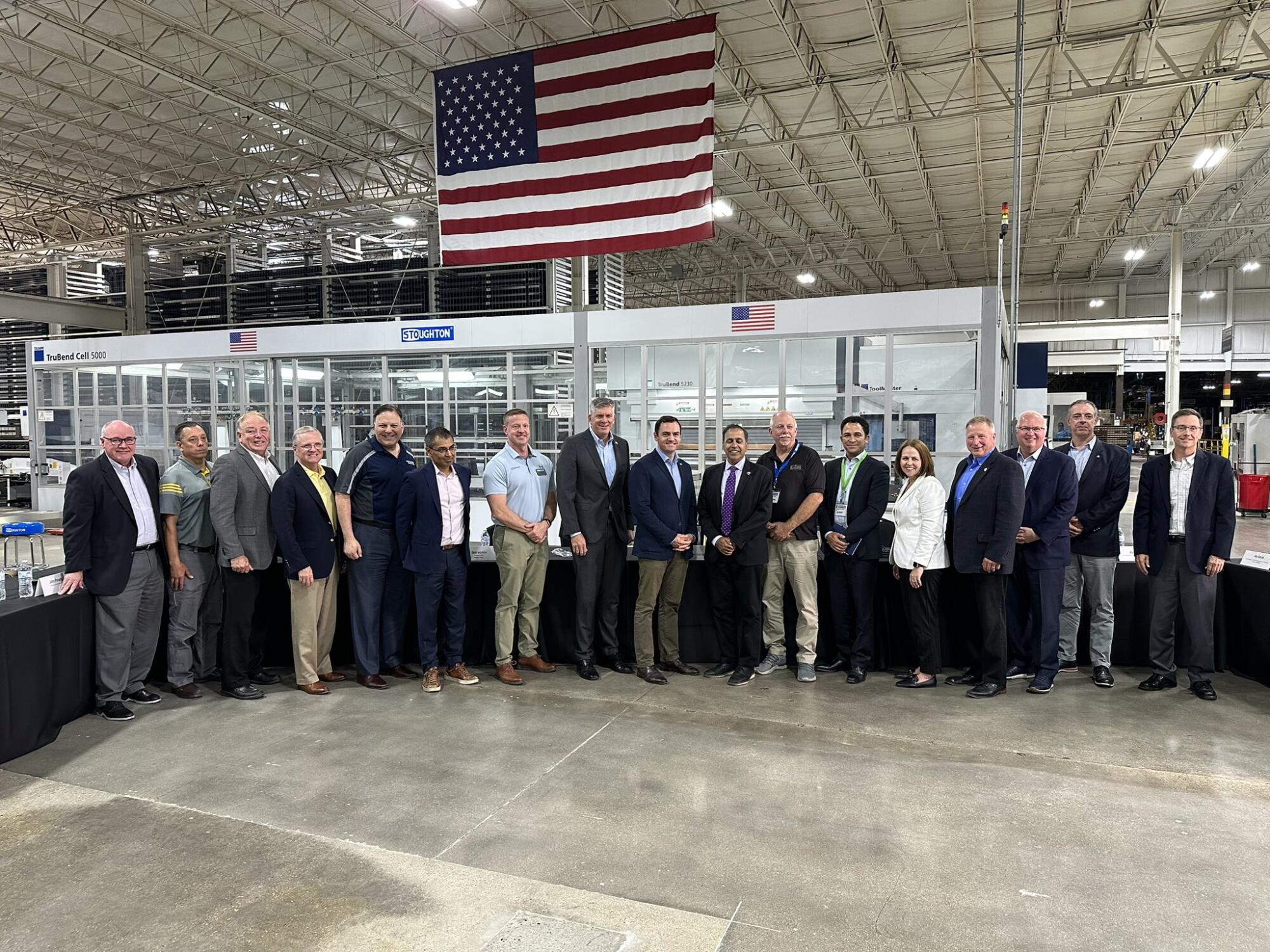Welcome to the September edition of A Capitol View
SMI is proud to be partnering with the Office of the Secretary of Defense to convene the first high-level workshop dedicated to speeding up the introduction of advanced materials into defense programs.
The invite-only gathering, “Accelerating the Deployment of Structural Material Systems for Global Competitiveness in the Twenty-First Century,” will take place Jan. 8-9 at SMI’s conference center in Washington.
Breaking down barriers: The workshop will identify the technical and policy challenges to inserting new structural materials into vehicles, ships, missiles, and other critical systems — and how industry can align its resources with Pentagon requirements at earlier phases of development.
“The purpose is to bring together all stakeholders to develop actionable plans to accelerate the deployment of advanced materials to support warfighter needs,” said SMI COO Ken Wetzel, who is playing a leading role in organizing the gathering and serves as the executive director of the United States Advanced Ceramics Association.
A clearer path: Participants will hear directly from top military acquisition and R&D officials, program managers, lawmakers, and staff to share perspectives on how industry can better align its resources with Pentagon requirements.
Day one will offer presentations from the military services, while day two will include panel discussions with prime contractors and suppliers outlining a clearer path to industry capabilities.
Ponying up: DoD also plans to unveil a new multi-million-dollar funding opportunity to turn the lessons learned into action at the event.
The workshop will be held at the controlled unclassified information and adhere to International Traffic in Arms Regulations.
Contact SMI Analyst William Willkomm for more information at william@strategicmi.com.
MANUFACTURING
‘PUSHING BACK’: A trio of SMI clients participated in a field hearing convened by the House Select Committee on the Chinese Communist Party on Aug. 30.
The session, which focused on the Chinese threat to American manufacturing, featured Jim Myers, technical director of MetalTek International; Jay Annis, senior VP of business development at McNally Industries; and Mark Vandroff, CEO of Fincantieri Marinette Marine.
“We’re very concerned about the price of steel, the price stability of other elements necessary for our business to supply parts to shipyards, and their availability such as with rare earth elements,” Myers told the panel.
Direct engagement: “The focus of the discussion was primarily on commercial competition with China and how they use subsidies and tax avoidance to beat American companies in the markets,” Annis shared afterward, describing the “worthwhile and very interesting” session was also a unique opportunity to engage directly with lawmakers on the sidelines.
“It is much harder to maintain an industrial base — both at the shipyard and all the great companies that supply ships with what they need — if you’re only supplying into primarily the military market, if you don’t have a large commercial shipbuilding market to supply into, you don’t get a healthy industrial base,” Vandroff testified.
HEATING UP: SMI took part in the Forging Industry Association’s automation conference at Kent State University at Stark in late August.
The industry is playing a growing role in rearming for great power competition and ensuring a sustainable and cutting-edge industrial base for advanced aircraft, automobiles, power generation systems, and more to enhance our security and improve our lives.
Big takeaways: Automation holds greater promise for more efficient and cleaner approaches to processing key alloys. But new investments in aging infrastructure are needed and robots cannot replace the skilled workforce that will keep a significant building block of our economy running hot for decades to come. That workforce is aging and the pipeline to replace it is not sufficient.
SMI is eager to help get these messages to decision-makers in Washington and translate them into collective action.
ENERGY
LAST CALL: The Department of Energy published a notice of intent for the second — and final — round of grants for electric battery manufacturing and processing under the Infrastructure Investment and Jobs Act.
Top priorities: The top priorities for qualified projects are expanding the domestic industry, supporting manufacturing workers, and promoting equity and environmental justice.
“DOE announced they will be attempting to spend all $3.5 billion remaining in this round of funding,” said SMI VP Samm Gillard. “I still think there will be delays due to contracting issues and technical viability constraints, but just the attempt is big news and will increase the amount of participation in this round significantly.”
DEFENSE
CLIFF DIVING: Congress is returning from the August recess facing down the Sept. 30 deadline to pass appropriations bills or face the prospect of a government shutdown. Major disagreements persist between the House and Senate over the 12 annual spending bills, including the defense budget.
Spending wars: The Senate’s $831 billion package includes $8 billion in emergency funding for Ukraine and Taiwan assistance. The $826 billion House version does not, and the hard-right House Freedom Caucus has made clear it will fight any more military aid to Kyiv.
What’s next: We expect a temporary funding measure will be needed to carry the government into December. But that, too, faces hurdles. President Joe Biden wants the continuing resolution to include $24 billion for Ukraine aid, as well as $12 billion for disaster relief and $4 billion for border security.
Policy differences: There are also fault lines between the two competing versions of the National Defense Authorization Act, which sets policy for the Pentagon. For example, the House wants to establish a special inspector general to review Ukraine aid and close DOD’s controversial Cost Assessment and Program Evaluation office. The GOP-led bill also includes a host of partisan provisions on abortion services, medical coverage for transgender troops and diversity initiatives that won’t fly with Democrats.
Related: FY2024 NDAA: Department of Defense Acquisition Policy, via Congressional Research Service.
ICYMI: 2023 Biodefense Posture Review, via Department of Defense.
TECHNOLOGY
WIRED UP: The Defense Department is poised to make some major announcements about its Microelectronics Commons effort that was established to help finance up to a dozen “hub nodes” to increase domestic wafer production.
The $2 billion program that was included in the CHIPS and Science Act is convening a meeting on Oct. 17-18 in Washington.
What we’re watching: SMI Director Aarzu Maknojia is on the lookout for officials to release their picks for hubs ahead of the session. “This meeting will be focused on helping people understand the hubs, their specialties, and how projects will be selected and awarded,” she says.
Related: Pentagon preps for $48B tech-research contracts, via Defense One.
COMMUNICATIONS
THE IDEAS INDUSTRY: One element of SMI’s expanding strategic communications practice is playing a leadership role in high-level public and private discussions with decision-makers and opinion leaders about national security priorities, technology investments, and policy solutions.
SMI VP Bryan Bender moderated a panel in August at the New York City Police Department and New York City Office of Technology & Innovation’s Cyber Intelligence and Counterterrorism Conference, titled “Over the Horizon and Front of Mind: The Next Global Disruptors.”
Over the horizon: The closed-door discussion took on AI, machine learning, disinformation, and other proliferating technologies and tools that pose new opportunities and challenges for intelligence analysis and security planning, as well as how to grapple with the growing challenge to public safety posed by the expanding commercial drone industry.
Next up for SMI comms is moderating an event later this month hosted by the University of Pennsylvania’s Perry World House, titled “Ninety Seconds to Midnight: Nuclear Dangers in the 21st Century. The event will feature Rachel Bronson, president and CEO of the Bulletin of the Atomic Scientists, and Joan Rohlfing, president and CEO of the Nuclear Threat Initiative.
Space is the place: Bryan will also be participating as a thought leader at the American Institute for Aeronautics and Astronautics’ annual ASCEND conference in Las Vegas in October, which is focused on “building our sustainable off-world future through collaboration.”
More energy news: One-year-old, US climate law is already turbocharging clean energy technology, via Associated Press.
CLIENTS IN THE NEWS
Visible work on OSU-led wave energy testing facility to begin in August, via Oregon State University.
Rotary-engine generators could put new spin on military tactical power, via Forbes.
Peter Huntsman is a CEO who doesn’t equivocate about climate, via Wall Street Journal.
Hermosa to shine for South32, via Mining Journal.
Stunning differences found between men and women in heart disease diagnosis, treatment and symptoms, via Medical and Life Sciences News.









